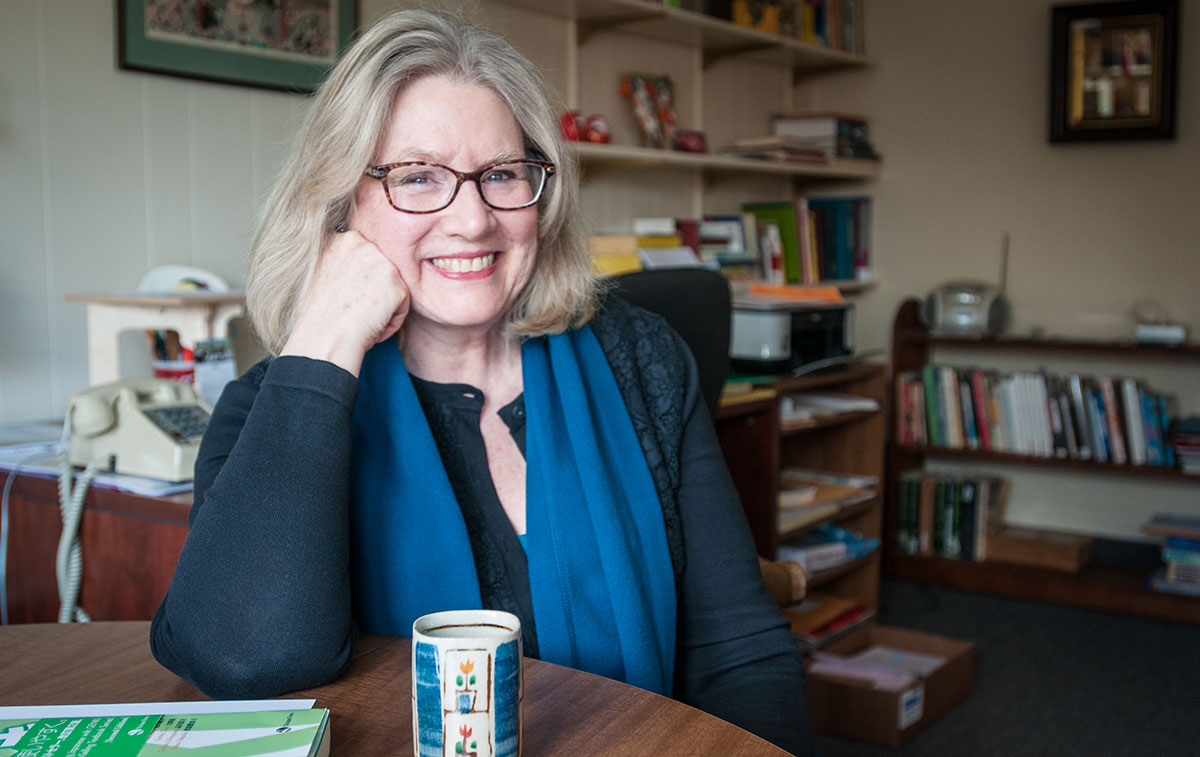Learning Japanese: ‘You’re walking in someone else’s shoes’

Professor Alice Valentine’s first encounter with Japanese language, literature, and culture came during high school, when she read what scholars believe to be the world’s first novel, “The Tale of Genji,” written by an 11th-century noblewoman.
“It was enough to fascinate me,” says Valentine, who turned her love of everything Japanese into a lifelong career. She is retiring this month after 33 years of teaching in Clark’s Language, Literature and Culture Department, including 17 years on the faculty as a teaching professor and three years as director.
“Japanese culture is so accessible and yet so vastly different,” she says, “and I think that’s what intrigues the students as well.”
Valentine began teaching Japanese at Clark and area colleges in 1990 after pursuing a doctorate in East Asian studies at Harvard and studying and living in Japan for six years. She officially joined Clark’s faculty in 2006.
She taught Japanese language courses and, in English, courses on culture: Japanese Pop Culture: Narratives of National Identity, offered as a First-Year Intensive; Japanese Women Writers; The Japanese Warrior Tradition; Memory and National Identity in Post-War Japanese Fiction and Film; and this spring, The National Imagination, a comparative literature course taught with professors Beth Gale and Eduard Arriaga, the department’s new chair.
Learning a language, Valentine explains, is not just about speaking and writing — it’s about “fitting into a culture’s understanding of communication. You’re walking in someone else’s shoes — you’re walking in their mindset and vocabulary. It helps you remain open-minded and self-aware of your own biases.
“One thing we do well at Clark is to constantly encourage that conversation,” she adds. “At Clark, students refine who they want to be.”
Over three decades, she introduced students to a wide range of Japanese literature, from 10th- and 11th-century classics to postwar novels like Nobel Prize winner Kenzaburō Ōe’s “Teach Us to Outgrow Our Madness” and modern-day bestsellers including Banana Yoshimoto’s “Kitchen.” Her students explored Samurai films like Akira Kurosawa’s “Throne of Blood,” the “Superflat” aesthetic of Takashi Murakami’s colorful postmodern art, and the Shinto symbolism and environmental themes of animation film director Hayao Miyazaki’s “My Neighbor Totoro,” “Princess Mononoke,” and the Academy Award-winning “Spirited Away.”
Anime and manga appeal to many Clark students — including those drawn to the Becker School of Design & Technology’s game design/interactive media programs — and are often their first introduction to Japanese culture, according to Valentine.
“The narratives are appealing because of that combination of intriguingly different but satisfyingly human,” she explains, “and they are sometimes quite progressive and edgy.”
Transgender, intersex, and nonbinary themes and characters abound in anime and manga. And unlike many Indo-European languages, Japanese does not include pronouns or gendered nouns.
Students feel affirmed by the broad spectrum of neurodiversity and gender they find in Japanese language and culture, Valentine notes. “In Japanese popular culture, there is a great deal of flexibility,” she says, even if politics are more conservative.
In Valentine’s time at Clark, students have always been progressive, she says, “but now they have global allies — they identify with their age group all over the world.”
Today’s students also are “much more aware of their vulnerabilities.” That means that it can be “harder for them to have that insular academic experience that I had,” Valentine acknowledges. “They are bombarded with information constantly, and having to sort it out takes a lot of bandwidth.”
Over the years, Valentine says, she has learned that students “can learn just as much outside the class as in. I have less confidence that what I’m teaching is their most valuable part of the day, and that’s not a bad thing.
“Their sophomore year at Clark, students blossom,” she adds. “Clark is a place where students become who they are, and this is a safe place to find out what their values are.”
As she heads toward retirement, Valentine feels confident that she is leaving the Japanese language and literature program — the only one in central Massachusetts — in good hands. Alex Murphy, who recently received his Ph.D. in Japanese language and literature from the University of Chicago, will begin as assistant professor at Clark this fall. Kuy Howard, assistant director of Clark’s Study Abroad and Away program, will continue teaching elementary Japanese courses. And for the second year, a generous gift from The Japan Foundation will enhance the program.
And while Valentine may be retiring from Clark, she has plenty of plans: visiting her three adult children, their partners, and five grandchildren in the United States and Italy; spending time with her husband, John Zeugner, WPI professor emeritus of history; and volunteering to work with English language learners at a local elementary school and with refugee families through Ascentria.


